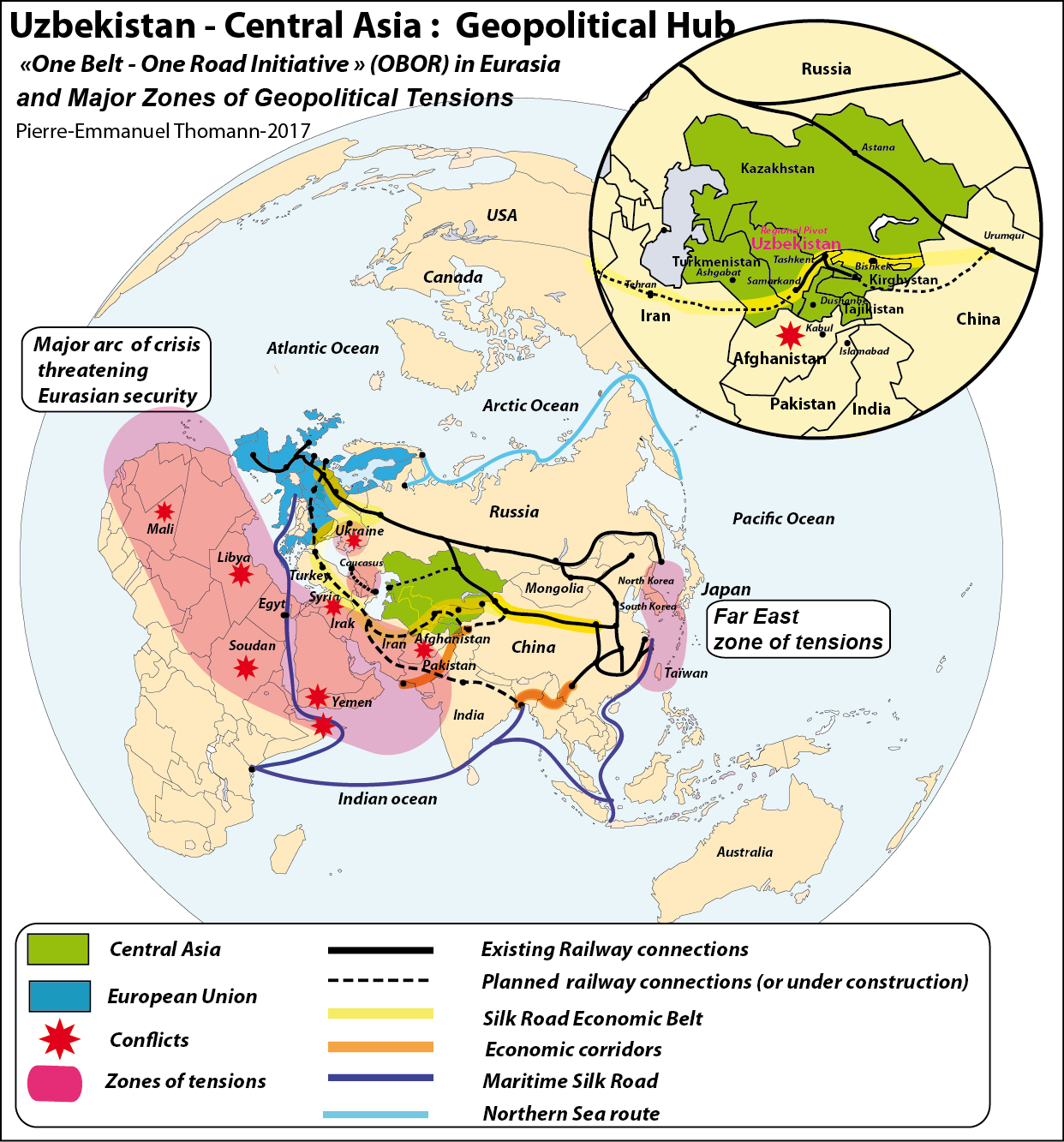
Central Asia cooperation process gets strong support from the United Nations
On 22 June 2018, the UN General Assembly adopted a resolution entitled “Strengthening regional and international cooperation to ensure peace, stability and sustainable development in the Central Asian Region”
This resolution, introduced by the representative of Uzbekistan, in the name of Kazakhstan, Kyrgyzstan, Tajikistan, Turkmenistan and Uzbekistan is aimed at gaining support from the international community the new process of cooperation of Central Asian States to ensure peace and stability in the region and promote shared spiritual and cultural heritage. The strong geopolitical dimension of this central Asian cooperation process is visible in the resolution which « Reaffirms that threats to stability and sustainable development in the region require closer and more coordinated cooperation between the States of Central Asia, as well as between them and international and regional organizations, and also reaffirms the importance of regional cooperation involving regional and international organizations in addressing these threats »
The promotion of stability in Afghanistan is also of utmost importance as the resolution is « Encourages the efforts of the Central Asian States to promote the peace process and social and economic development in Afghanistan and their participation in the regional political and economic processes, and underscores the importance of the Kabul process as a main forum and vehicle for peace initiatives on Afghanistan, as well as other regional and international conferences, including the Tashkent Conference on Afghanistan: Peace Process, Security Cooperation and Regional Connectivity, held on 26 and 27 March 2018, as ongoing efforts of the international community to support the Afghan-led peace and reconciliation process »
Before this recognition from the UN , the process of Central Asian cooperation was launched on the global stage after Central Asian consultations at the conference « Central Asia, Shared past and Common future, Cooperation for Sustainable Development and Mutual prosperity ». organized in Samarkand, Uzbekistan, on the 10 and 11 November 2017,. it marked a breakthrough and aroused great interests and high ranking guest represented states and international organizations. It was organized by the government of Uzbekistan, the UN regional centre for Preventive Diplomacy for Central Asia and the UNDOC Regional office for Central Asia.
Since the election of the new president of Uzbekistan, Central Asia became the core priority of Uzbekistan’s foreign policy, and the new doctrinal focus is about creating stability, security and good-neighbourliness belt around Uzbekistan. The objective is to take advantage of the huge unrealized potential of the region. Uzbekistan has a common border with all other Central Asian states. This new process is not about creating a new international organisation in Central Asia or any integration structure with supranational bodies, but to organize regular meetings of the Head of Central Asian states and Central Asian foreign ministers to implement a program of cooperation on borders security, terrorism, distribution of water resources, trade, transport and energy infrastructures (Uzbekistan-Kyrgyzstan-China;Uzbekistan-Turkmenistan-Iran-Oman corridors…), but also in education, science, tourism and culture. A first programme for the years 2018-2019 was signed on the sidelines of the Samarkand conference. Uzbekistan was always keen on importing new inspiring ideas from abroad, but also keen on building its own model adapted to its specific, history and culture, and geographical position.
This initiative is also a new geopolitical laboratory to strengthen synergies between international organizations like EU, NATO, OSCE, SCO, CIS under UN coordination and reinforce bilateral relations, to achieve stability under the principle of «indivisibility of security», on the Eurasian continent with a better balance of interests. SCO Secretary-General Rashid Alimov and OSCE Secretary General Thomas Greminger met in Samarkand on 10 November 2017 on the sidelines of the international conference and confirmed the OSCE’s intention to strengthen cooperation with the SCO in light of the common challenges and threats facing Eurasia. The participants of the conference also supported the proposal on drafting a UN general Assembly Resolution by the Central Asian states on enhancing regional and international cooperation in the region.
This is an ongoing process and many challenges need to be met in order to secure a decent future, has stressed the Uzbek president. This is why this initiative needs active support from European states and EU, since it matches European geopolitical interests. It is in the interest of European nations and EU to face a more stable and multicentric world as it would offer new opportunities for European nations and states on the Eurasian continent.
This initiative, if successfully implemented, is likely to modify the future geopolitical balance of power of the region since Central Asian states wants to be more united vis-à-vis surrounding great powers, and projects stability in Afghanistan, in times of dangerous geopolitical fragmentation. This initiative has the potential to become a new model for stability and peace in Eurasia.
The objective is to make Central Asian States more influential and prosperous, and better take advantage of the New Silk Road initiative. The future East-West transport, economic and energetic corridors offer a new horizon for Europe on its Eastern flank.
Central Asia plays was so far also playing the role a buffer zone barring instability and further Eurasian fragmentation coming from external crisis and instability from Afghanistan. Central Asian region aspires now to become a pole in its own right. As a strong civilizational pole associated with a new Central Asian Renaissance, the region is containing and preventing the proliferation of religious extremism. European security is intertwined with Central Asia, since this region is becoming one of the major pivots of the Eurasian continent. Cooperation on transnational terrorism, the issue of radicalisation, the stabilisation process in Afghanistan between EU and Central Asian states is therefore a necessity. During the conference, Federica Mogherini – High Representative of the Union for Foreign Affairs and Security Policy/Vice-President of the Commission therefore acknowledged that EU and Central Asia shared « the same security interests ».